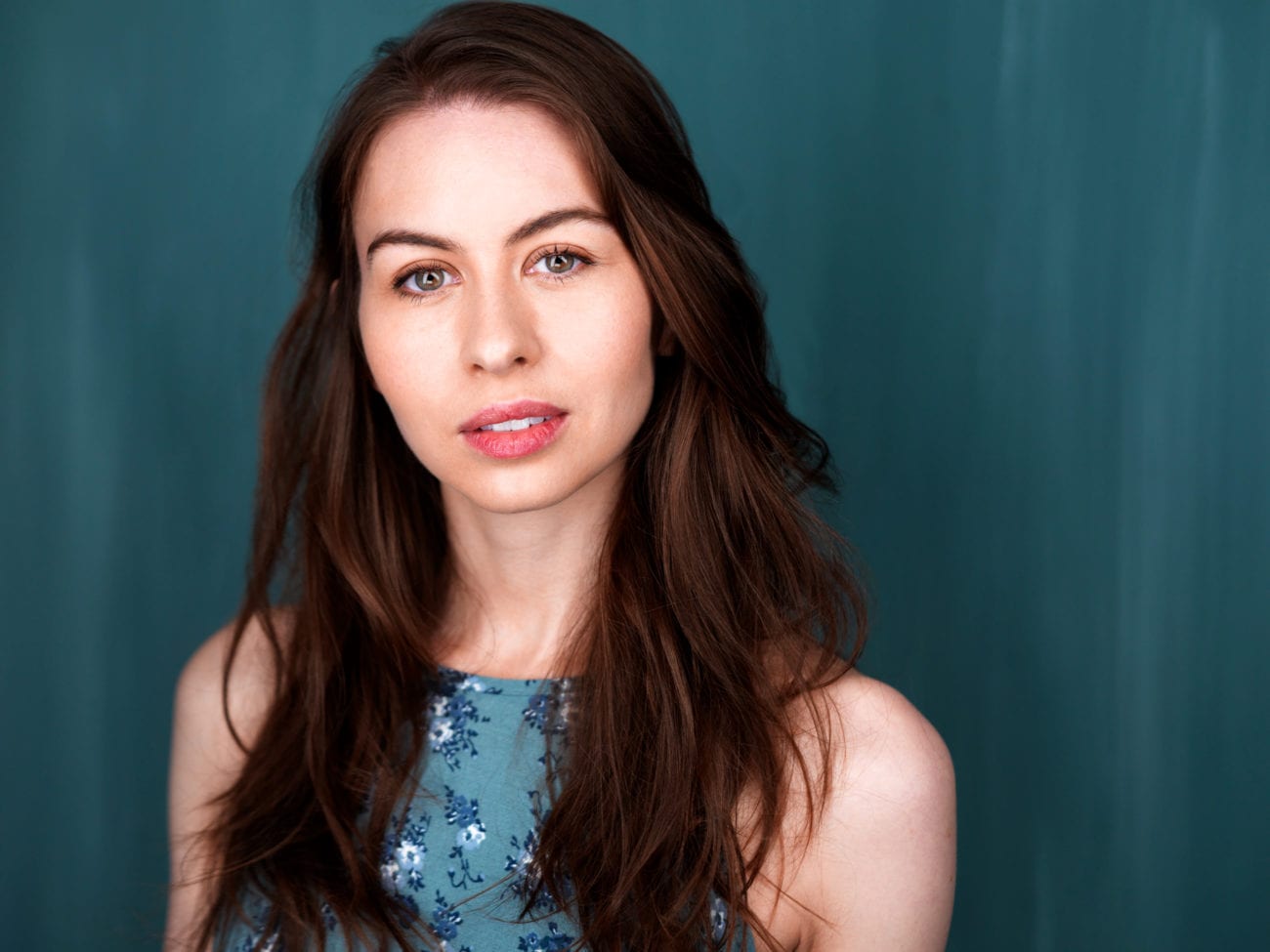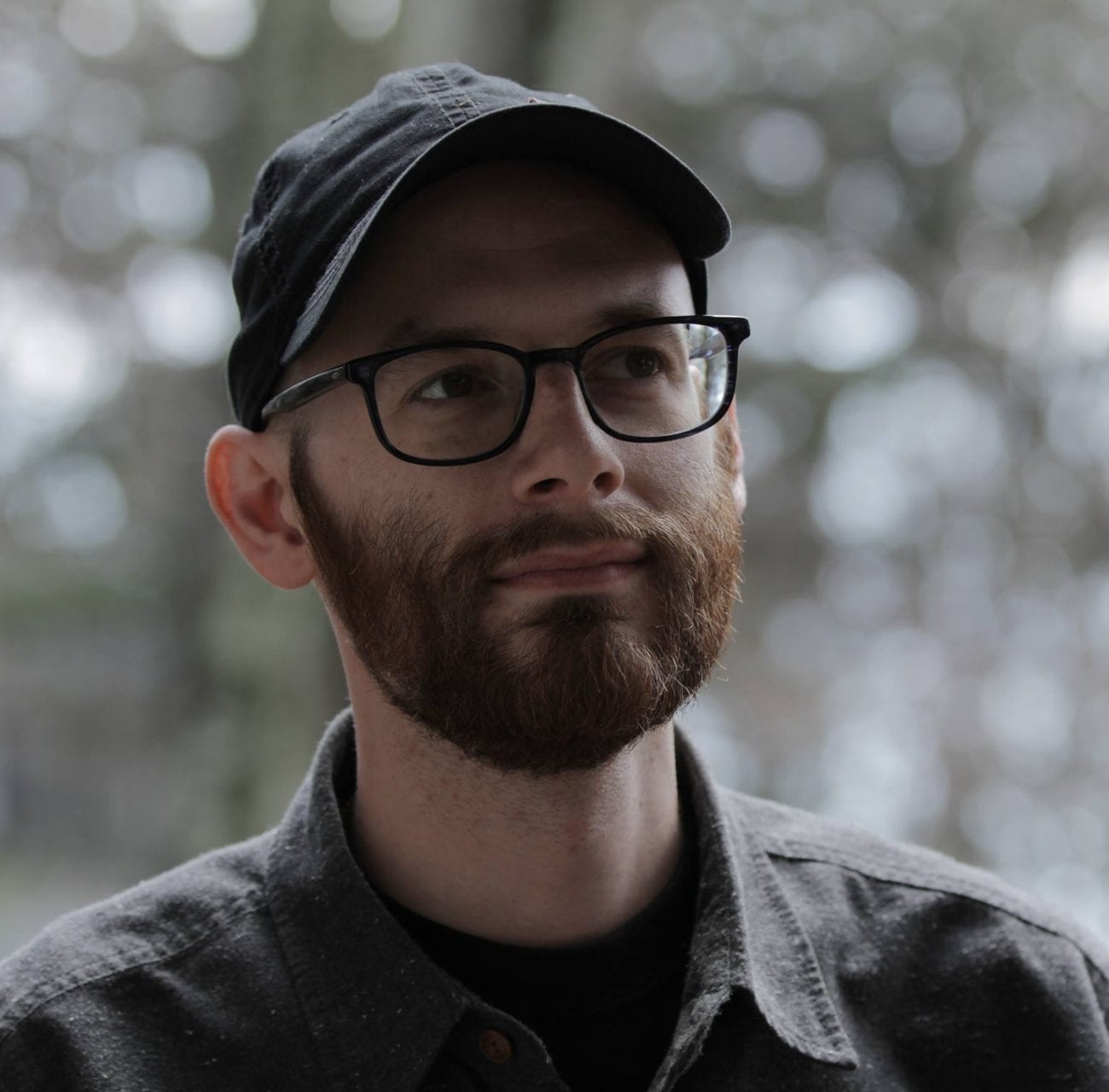An Unquiet Grave is one of those simple, sparse films which naturally leaves you with questions at the end. So once I connected with one of the writers, Christine Nyland, on Twitter, I just had to ask for an interview.
Christine (also one of the key cast of the film) wrote the script with Terence Krey, and they both took time out of their new project to meet with me on a video call. They had been working together since Christine had an acting role in Terence’s web TV series Graves, and soon after, discovered they had a similar interest in the supernatural as a metaphor for real life, and thus started the partnership.
I asked them both where the idea for An Unquiet Grave came from. Christine answered, “There are plenty of stories about someone ‘coming back wrong’ and the dangers of resurrection and so on, but we were really interested in turning that idea around. What if she didn’t come back wrong? What if she’s not a zombie and nothing is wrong with her, but the life that comes after death is inherently different from the one which comes before? And he can’t go back, so even when he gets what he wants, it’s not what he wants. Jamie just can’t avoid that differentness.”
Many filmmakers say they draw their ideas from real life, but it didn’t sound that way for this pair! I had been kind of expecting one of them to mention bereavement in their histories that they had drawn on for the script. “Not explicitly,” said Terence. “I think we pulled from a lot, perhaps friends who had lost people, but I don’t think there was a direct family member that either of us recalled. I do think what’s interesting about this film, something that I started grabbing as I shifted from writer to director was that it is a movie about grief but also the ways we can hurt other people when we ourselves are hurting. We can do really terrible things once we’ve experienced a serious loss. I think loss is much more universal: what Jamie goes through is an extreme loss, but I feel like people lose things all the time, whether relationships, stability, whatever. The way that makes you angry and reaching and hurting people around you who could actually be your support…That’s the tragic thing about the film: there’s such a potential for support between these two people who have a shared loss, but this is so not in Jamie’s head.”
We can do really terrible things once we’ve experienced a serious loss.
-Terence Krey
I can only agree: grief is only ever in one’s own head, never quite experienced the same as the next person and so very difficult to share. “That’s something we’ve discussed,” added Christine. “The size of this film is really serendipitous to serving it. It’s so intimate, and grief is intimate. One of the interesting things about Jamie and Ava is they are missing the same person, and yet their experiences of missing are so separate that they cannot connect over that. It’s just so particular.”
Christine had mentioned her frustration on Twitter that other reviewers had not picked up on the consent issue. I raised this gently in our call and she nearly burst: “I’d just been waiting! And you know I could answer your question about writing from life that I didn’t pull from any loss, but I did pull from relationships when I had felt violated or betrayed. It’s really interesting that we’ve had such mixed responses about the ending: some people dig it and some just do not. We had a hard time cracking the ending, even discussing whether Ava should come back and kill him, which would be a great, fun, cathartic ending, but these people just don’t get the relief they need.
“She’s dead and they need to just sort that out! The end of the film is unsatisfying because when you’re in a relationship in which you’ve grown to trust somebody—which happens off-screen, because Ava and Jamie are not close in that opening scene and then by the time we jump to the night of that ritual she’s really come to trust him and appreciate what he’s doing—and he then exploits that, literally uses her body to his own ends. And I think we wanted to leave the film with a sense of what do you do after that? It’s all well and good having revenge fantasy horror movies that are a lot of fun to watch with a bloodbath at the end, but if only life could be that complicated! If only I could just kill the person and then feel better! But (a) I wouldn’t kill them, and (b) I wouldn’t feel better. You’re just left with having made a mess, and now you’re stuck with it. It’s not satisfying.”

Terence reined in the topic a little: “Back to that question of people not clocking the consent aspect, you know, I feel that’s in tandem with people not enjoying the second half. To me, the second half pins on this: if you don’t feel deeply unsettled by the fact that he’s put someone else in Ava’s body and got her walking around like that, unsettled by every moment thinking about that, I can see how the film falls flat. I remember when we decided to take the story home: what if we just hard cut and they’re home?”
Christine remembered that too: “It didn’t feel good at all. Any time you write something in horror and it makes you go ‘oh eurgh no’…then it goes straight into the script.”
Time to dig a bit deeper. I asked the pair why they thought the consent aspect hasn’t been given enough attention by the critics. Was it not noticed, not understood, or something else? “I think it’s probably an intersection of a number of things for different people,” answered Christine. “For some people, it might just be they didn’t have an experience like that in their lives to connect to. And it’s not really a familiar thing in the canon. Also, it’s our first movie—there are definitely things we might do differently if we made it now, things about the story we might make clearer. We’re learning a lot about how to make our intention manifest on the screen, so I’m sure it’s a mixture. It is exciting when it hits for people. When my sister saw it, that was the first thing she recognized and wanted to talk about. I think with any movie, you’re coming to it with your own experiences, and what happens between you and the movie is a conversation about your life.” That’s certainly the case for my viewing of the film.
I didn’t pull from any loss, but I did pull from relationships when I had felt violated or betrayed.
– Christine Nyland
That brought us somehow to the character of Jamie, who only thought about his own perspective on the loss of Jules. “That’s trauma for you,” said Christine. “It’s when something happens that breaks your understanding of either yourself or your world. Jules died, and it felt so unfair to Jamie that it was like morality must not be real either, there must not be any rules.”
Philosophical musing aside, there was still a bit more to ask about the writing: did Christine or Terence have to do much research? “We definitely researched rituals, like those to do with gods of the underworld,” said Christine, “so there’s some fun logic to the ritual in the film that only we know about. A lot of that stuff is to do with burying things, pouring things into the earth; so the stage that she holds where smoke goes up, that’s really not in alignment with genuine rituals. So we figured that’s the part that Jamie made up and added so that he could have access to her arm. I actually did a lot of research about dead bodies, partly for the writing and to give guidance to make-up, but also for my work as an actor because that’s where we meet Ava. She’s fixated on what’s going on with her sister, rotting and decaying, and I think Ava must have spent time looking into it too.”
I laughingly complained about those thoughts in my head, as I have a younger sister myself! “I’m so sorry!” said Christine. “You know we had a picture, and I sent it to my mother, a photograph of my body made into a cast, which I thought was really neat. But my mother was like, ‘Why would you send me this?’ Nobody but me liked it!”
And apart from playing a dead person, what had it been like for Christine to play two different personalities? “A huge challenge,” she said. “Especially because they are twins, they grew up in the same household, so there’s a fine line: do they have the same mannerisms because of those similar influences? But also, Jules never comes fully back, never actualizes it beyond being in a body that feels weird. So that was really hard because it’s so easy to get into a headspace of doing enough versus overplaying, and Jules was such a challenge to just let her be. It was also a really fun challenge. How often do you get to do that?”
In terms of the direction of the film, I asked Terence what the challenges were of working with a two-person cast: they had to carry the whole thing by themselves. “Yeah, there are a lot of things that are great working with a small cast,” said Terence, “like you’re really able to dig in, with plenty of time to rehearse. But the direction has to go outside of the cast, too. How do we keep the space and the visuals interesting? Otherwise, it’s just two people who are focused on themselves. My challenge was about serving them and the needs of the film, which goes both ways: you want to make an interesting film but without dragging the audience away from the central characters. It really is a story told on two people’s faces.”

An Unquiet Grave has recently been released on Shudder, and I asked how that’s gone down. “It’s been amazing!” said Christine. “It’s so neat! That web series we made was seen by our friends and some people, but there wasn’t, like, any sense of an audience. But last night, we found people live-tweeting while watching the film, and that’s so amazing, especially for something that we’ve put so much into—ourselves, our processing of the world. That’s the thing with art, though: it’s to share and be in conversation with an audience. And this is the first time we’ve really had that.”
“I’m a little bit still in shock,” added Terence. “Shudder’s done a great job. And this being our first film, and discovering we have an audience watching it, that’s a relatively new and humbling thing.”
From the present day to the future: I asked what Christine and Terence are working on next. “Right now, we’re crewing for a friend, but later this summer, we’re shooting a movie called Summoners, which is like a love letter to Practical Magic. It’s a fun summer witch movie. Then last year, we made a movie called Distress Signals, which is about a woman abandoned in the woods, all about grappling with her situation and how she got there. That one’s in post-production.”
“Yeah and beginning to get submitted to festivals,” added Terence.
“There’s plenty of trauma in both those films,” laughed Christine.
It really is a story told on two people’s faces.
-Terence Krey
I had read on Christine’s website that her “work is rooted in a preoccupation with trauma and an unending desire to understand what it takes to finally heal.” She told me that making movies—regardless of how serious they are—can be lots of fun. Terence firmly agreed: “It’s the best expenditure of energy for a positive result.”
“You know I’ve found that the more I’m making movies,” said Christine, “the less I know what to do with myself when I’m not doing it.”
Terence was the director of An Unquiet Grave, as well as the co-writer, and therefore had a different career trajectory to land here. I asked what it had been like to step up from short films and web series to suddenly making something much bigger. “Because you’re holding a whole film in your head, and there’s not necessarily much more time [than when making shorts], the minutiae melt away, and you’re more focused on things that really matter rather than things which don’t. I’ve met friends who’ve said ‘I could never make a feature film, it must be so much work,’ and of course in some ways, it hundred percent is a lot of work; but it’s also about letting go and trusting yourself, trusting your ability to handle the workload, that you’ve got the script in your bones. I know people who have been more meticulous on short films than I ever have, and yet think they could never make a feature. But yeah, if they can make a short, they can change the way the energy goes here and there and it will happen.”
It must have helped to have people around him who he’d worked with before. Jacob Ware (who plays Jamie) had been in Graves, for example. “Oh yes,” Terence agreed. “And we were friends, too. But it’s a strong team in other respects. Christine isn’t just actor and co-writer, she’s also a producer on the film too. We’re able to tackle things as a team and talk about big-picture stuff and look at the film from several different angles. The DP [director of photography] of the film, Dan [Daniel Fox], I’ve known since fifth grade, and we’ve made films together before; and Hugo [Hugo Lopez], who did the score, is an old friend. So there’s a good cohort.”
While I had Terence’s attention, I asked a cheeky question just for him: did you ever worry that the actor who was one of your writers would improvise and alter the script as she went along? “No, no,” answered Terence, “she’s much more of a words-magic person.”
“That’s a theatre thing,” explained Christine. “In film, you have more leeway, but I have a theatre background: you do not rewrite what the playwright has provided—the playwright is god. In films, the director is the be-all-and-end-all, but in theatre it’s the writer.”
It’s a dynamic that has clearly worked for them: long may it continue.


